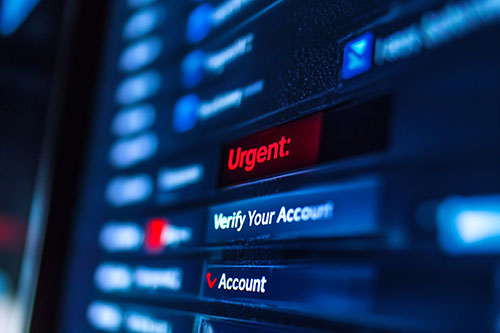Protecting our community for 175 Years
Consumer Alerts
October Is Cybersecurity Awareness Month: Stay Cyber Safe

October is more than pumpkin spice and fall leaves - it’s also Cybersecurity Awareness Month. With more of our daily lives tied to digital devices, staying safe online isn't optional anymore - it's essential. Cybercriminals thrive on people's bad habits, and one weak link can open the door to identity theft, financial loss, or worse. This month is the perfect time to evaluate your digital practices and lock things down.
Password Best Practices
Passwords are your first line of defense, but too often they're treated like an afterthought. “123456,” “password,” and “qwerty” still make the top of most-breached lists year after year. Strong passwords should be:
- At least 12-16 characters long.
- A mix of uppercase, lowercase, numbers, and symbols.
- Unique to each account—never recycled across platforms.
Consider using a password manager to keep track of them. It's safer than sticky notes, your phone's Notes app, or your memory alone.
The Power of Passphrases
Passphrases are today's smarter alternative to traditional passwords. Instead of a jumble of random characters, a passphrase strings together unrelated words into something memorable but hard to crack.
Examples:
- PurpleTacoSunset!42
- Correct-Horse-Battery-Staple
- ShinyPianoDragon2025
Passphrases are harder for brute-force attacks to break while still being easy for you to recall. Just avoid using famous quotes or song lyrics - they’re predictable.
Practicing Good Internet Hygiene
Think of internet hygiene the way you think of personal hygiene: skip it, and problems pile up quickly. A few habits to build:
- Update software regularly. Patches exist because hackers love exploiting outdated apps and operating systems.
- Use multi-factor authentication (MFA). Even if someone steals your password, MFA keeps the door locked.
- Avoid public Wi-Fi without protection. If you must connect, use a VPN.
- Back up your data. Ransomware can’t hold you hostage if you’ve got a secure backup.
What Not to Share on Social Media
Oversharing is a hacker's dream. Personal details that seem harmless often provide the keys to your digital life:
- Birthdates, addresses, and phone numbers (perfect for identity thieves).
- “Fun facts” like your first pet’s name or mother’s maiden name (these are often security question answers).
- Travel plans or live location tags (you’re broadcasting when your home is empty).
If it’s something you wouldn’t tape to your front door, don't post it online.
Final Word: Stay Cyber Safe
Cybersecurity can sound overwhelming, but it boils down to being cautious, consistent, and a little skeptical. Treat your digital life the way you treat locking your house or car - you do it automatically because it matters. This month, make a commitment to stronger passwords, smarter habits, and safer sharing.
When it comes to protecting your identity, finances, and peace of mind, one weak click is all it takes. Stay sharp, stay safe - stay Cyber Safe.